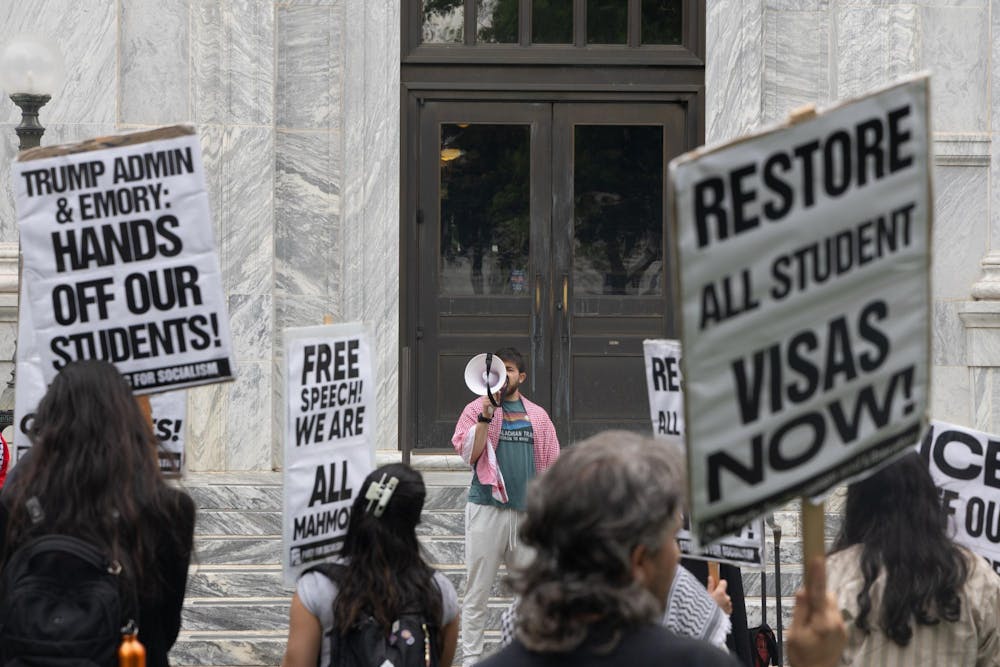A year after weeks of protest on Emory University’s campus, Emory Students for Socialism (SFS), Emory Students for Justice in Palestine (ESJP), Emory Divest Coalition, Faculty and Staff for Justice in Palestine-Georgia (FSJP) and Public Health for Palestine & Collective Liberation began their commemorative week of action with a rally on the Emory University Quadrangle against recent visa revocations on April 22.
Around 25 people attended the protest, the first in a series of events commemorating the anniversary of the April 25, 2024 protests this Friday. The week of action included the anti-Immigration and Customs Enforcement (ICE) rally, a mobile archive event on April 23 and a field organizing training on April 24. Additionally, pro-Palestinian groups will hold events on April 25.
Emory SFS Vice President Saharla Mohamoud (26C) began the rally by recognizing ICE’s recent terminations of four Emory community members’ visa records.
“Our community is under attack,” Mohamoud said. “It isn’t just the four members of our community who have had their visas revoked, we have seen over 300 people’s revocations of student visas across the country over the last couple of weeks.”
U.S. District Court for the Northern District of Georgia Judge Victoria Calvert granted a temporary restraining order to halt the visa terminations of over 100 plaintiffs, including one current Emory student. Pro-Palestine activist Jawahir Kamil spoke at the rally about the hearing on April 22.
“I was in 75 Ted Turner Drive,” Kamil said. “There was over 130 students from Georgia, from Atlanta, Georgia, from different schools. They got their visas revoked, and then lawyers called an emergency to go to court ... The judge ordered in favor of the students.”
Kamil highlighted the court order as a victory for international students, student activists and free speech in the United States.
ESJP member Ibrahim, who asked to only be identified by his first name due to safety concerns, highlighted the sense of fear and apprehension on Emory’s campus, heightened by the police response to last year’s encampment.
“I’ll never forget, after April 25, after the encampments, I just watched my friends get arrested, brutalized, tased, tackled,” Ibrahim said.
During his speech, Ibrahim also mentioned an op-ed published by The Emory Wheel on April 16, praising Contributing Writer Josselyn St. Clair (26Ox) for her honesty in describing the culture of fear on Emory’s campus following April 25, 2024.
“When she came to Emory, she said she would go to protest, she thought she would stand up for human rights, for Palestinian freedom and liberation, but she just couldn’t bring herself to do it,” Ibrahim said.
Ibrahim hopes messages like St. Clair’s will resonate with other students, citing his own experience and student activists’ struggles to attract large groups of people for protests. According to Ibrahim, international students especially are apprehensive about getting involved.
“There’s been, obviously, a very steep drop off in attendance at protests, at rallies,” Ibrahim said. “Because they’re really afraid of having their names associated with it.”
According to Emory SFS Media Liaison Abigail Young (28G), the groups hope the week of action will help the community remember the events of April 25, 2024, particularly in the context of executive orders by President Donald Trump’s administration. Young noted that while SFS framed the rally around the ICE visa revocations, other issues, such as the Israel-Hamas war and recent firings at the Centers for Disease Control and Prevention, are driving student activism on campus this week.
“There’s a rising sense of anger again, resurgence,” Young said. “People are remembering what happened. And also, we can’t ignore the context of the Trump administration’s attacks generally on the University, because lots of people are out here for a lot of different reasons.”
While the Trump administration’s orders are at the top of many student organizers’ minds, Ibrahim believes that students also need to pay attention to issues on Emory’s campus.
“It’s unfortunate that we are still in a very highly toxic, highly Islamophobic environment on campus, but, of course, we’re still working to address that. One of the biggest reasons that it hasn’t changed is President Fenves,” Ibrahim said. “He is honestly rotten to the core, he's the core issue at Emory. And nothing will change for Muslim and Arab students until he is replaced.”
According to Ibrahim, the main organizers of the week of action hope to make this week “as safe as possible.”
“We can’t forget about the brutality that occurred,” Ibrahim said. “We had this week of action to galvanize people, to show Emory what we’re made of, that we’re not backing down, that just because we had been arrested, because there’s been a lot of suppression, doesn’t mean that we’re gonna stop advocating. And so this week of action is meant to build community and to raise our voices at Emory.”

Ellie Fivas (she/her) (26C) is from Cleveland, Tenn., and is majoring in political science and history on the pre-law track. When she is not working for the Wheel, she works in prison education, leads a human rights club and works at the Emory Writing Center. In her free time, you can find her reading trashy romances and The New York Times, basking on the Quadrangle and doing crossword puzzles.









